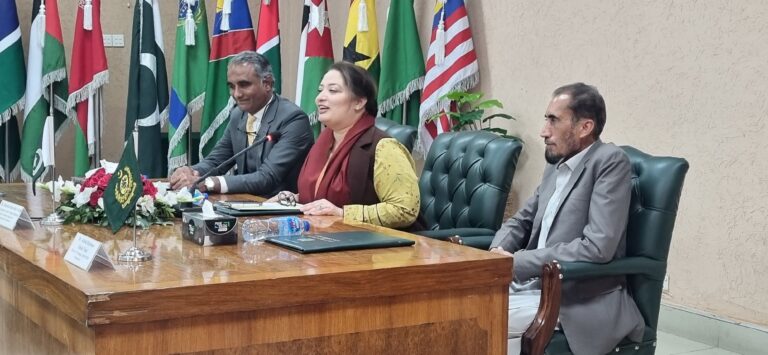Islamabad, Feb 10: Romina Khurshid Alam, Coordinator to the Prime Minister for Climate Change, highlighted the mounting climate challenges faced by developing countries, particularly the members of the African Asian Rural Development Organization (AARDO). Speaking at a training program on “Disaster Management and Climate Change Adaptation”, she stressed that limited financial resources and inadequate infrastructure significantly amplify the impacts of climate change, urging for immediate global cooperation and the adoption of sustainable climate solutions.
During her address, Alam emphasized that climate change is an urgent global issue, with developing countries within AARDO particularly vulnerable. She mentioned that countries like Pakistan and Bangladesh face flooding risks due to glacial melt and changing monsoon patterns. Meanwhile, countries like Kenya and Zambia struggle with severe droughts, significantly impacting agriculture and water availability. Malaysia and Oman are battling rising sea levels, threatening coastal communities and infrastructure.
READ MORE: Govt Plans to End Excise Duty on Property Deals
Alam also pointed out the water scarcity issues faced by countries like Jordan, Palestine, and Namibia, which are among the most water-stressed in the world. Soil degradation is also a serious concern in countries like Syria and Ghana, exacerbating food security risks.
She noted that many developing nations are already grappling with rising temperatures, erratic rainfall, and extreme weather events, including droughts, floods, and cyclones. Alam stressed the need for regional collaboration to manage disasters and adapt to climate change effectively.
The one-week training program, which began on January 9th, was organized by the Akhtar Hameed Khan National Centre for Rural Development (AHKNCRD) in collaboration with AARDO. Alam expressed her belief that this training would equip participants with the necessary knowledge and skills to implement effective disaster management and climate adaptation strategies in their respective countries. She also emphasized the importance of knowledge sharing, capacity building, and fostering innovative solutions for sustainable development.
Alam praised the NCRD for its commitment to rural development and poverty alleviation, particularly through its collaboration with AARDO and its efforts across Pakistan and other member countries. The AHKNCRD, based in Islamabad, is a capacity-building government institute working alongside AARDO, which consists of 32 member countries from Asia and Africa.
Alam concluded by reiterating Pakistan’s increasing vulnerability to climate change impacts and the urgent need for comprehensive disaster management strategies and collaborative adaptation measures to build resilience in the face of these evolving challenges.









